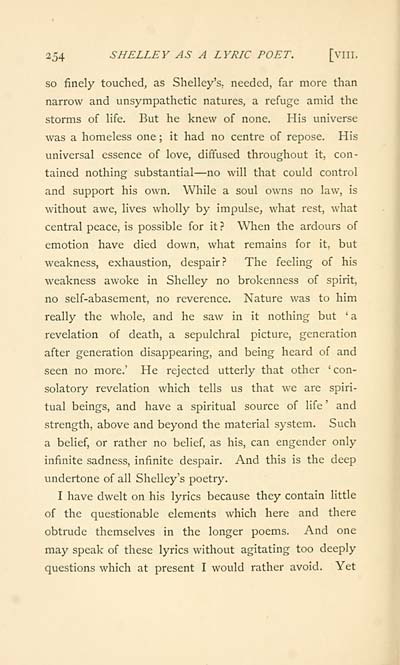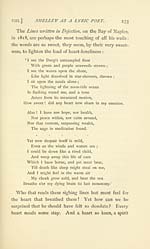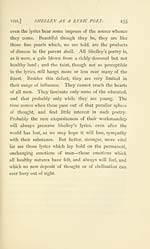Ossian Collection > Aspects of poetry
(270)
Download files
Complete book:
Individual page:
Thumbnail gallery: Grid view | List view

254 SHELLEY AS A LYRIC POET. [vill.
so finely touched, as Shelley's,, needed, far more than
narrow and unsympathetic natures, a refuge amid the
storms of life. But he knew of none. His universe
was a homeless one ; it had no centre of repose. His
universal essence of love, diffused throughout it, con-
tained nothing substantial — no will that could control
and support his own. While a soul owns no law, is
without awe, lives wholly by impulse, what rest, what
central peace, is possible for it ? When the ardours of
emotion have died down, what remains for it, but
weakness, exhaustion, despair? The feeling of his
weakness awoke in Shelley no brokenness of spirit,
no self-abasement, no reverence. Nature was to him
really the whole, and he saw in it nothing but 'a
revelation of death, a sepulchral picture, generation
after generation disappearing, and being heard of and
seen no more.' He rejected utterly that other 'con-
solatory revelation which tells us that we are spiri-
tual beings, and have a spiritual source of life ' and
strength, above and beyond the material system. Such
a belief, or rather no belief, as his, can engender only
infinite sadness, infinite despair. And this is the deep
undertone of all Shelley's poetry.
I have dwelt on his lyrics because they contain little
of the questionable elements which here and there
obtrude themselves in the longer poems. And one
may speak of these lyrics without agitating too deeply
questions which at present I would rather avoid. Yet
so finely touched, as Shelley's,, needed, far more than
narrow and unsympathetic natures, a refuge amid the
storms of life. But he knew of none. His universe
was a homeless one ; it had no centre of repose. His
universal essence of love, diffused throughout it, con-
tained nothing substantial — no will that could control
and support his own. While a soul owns no law, is
without awe, lives wholly by impulse, what rest, what
central peace, is possible for it ? When the ardours of
emotion have died down, what remains for it, but
weakness, exhaustion, despair? The feeling of his
weakness awoke in Shelley no brokenness of spirit,
no self-abasement, no reverence. Nature was to him
really the whole, and he saw in it nothing but 'a
revelation of death, a sepulchral picture, generation
after generation disappearing, and being heard of and
seen no more.' He rejected utterly that other 'con-
solatory revelation which tells us that we are spiri-
tual beings, and have a spiritual source of life ' and
strength, above and beyond the material system. Such
a belief, or rather no belief, as his, can engender only
infinite sadness, infinite despair. And this is the deep
undertone of all Shelley's poetry.
I have dwelt on his lyrics because they contain little
of the questionable elements which here and there
obtrude themselves in the longer poems. And one
may speak of these lyrics without agitating too deeply
questions which at present I would rather avoid. Yet
Set display mode to: Large image | Transcription
Images and transcriptions on this page, including medium image downloads, may be used under the Creative Commons Attribution 4.0 International Licence unless otherwise stated. ![]()
| Early Gaelic Book Collections > Ossian Collection > Aspects of poetry > (270) |
|---|
| Permanent URL | https://digital.nls.uk/78388512 |
|---|
| Description | Selected books from the Ossian Collection of 327 volumes, originally assembled by J. Norman Methven of Perth. Different editions and translations of James MacPherson's epic poem 'Ossian', some with a map of the 'Kingdom of Connor'. Also secondary material relating to Ossianic poetry and the Ossian controversy. |
|---|
| Description | Selected items from five 'Special and Named Printed Collections'. Includes books in Gaelic and other Celtic languages, works about the Gaels, their languages, literature, culture and history. |
|---|

